Given that he had cheated death in the 2002 Bali bombings and subsequently defied all medical predictions that he would ever walk again, the fact that he shot 132 that day in the 2007 Australian Amputee Golf Open was pretty insignificant.
“I absolutely loved it,” Ben Tullipan recalls 13 years on from his debut competitive appearance. “I met some amazing people who had some incredible stories to tell, and even though I came last it really didn’t matter to me.”
Now an 12-handicapper, Ben’s mission is to get down to 4 by next year, with the help of his coach Ian Jones. Given how much he has already achieved since that fateful night in Kuta 18 years ago, few would bet against him reaching his aim.
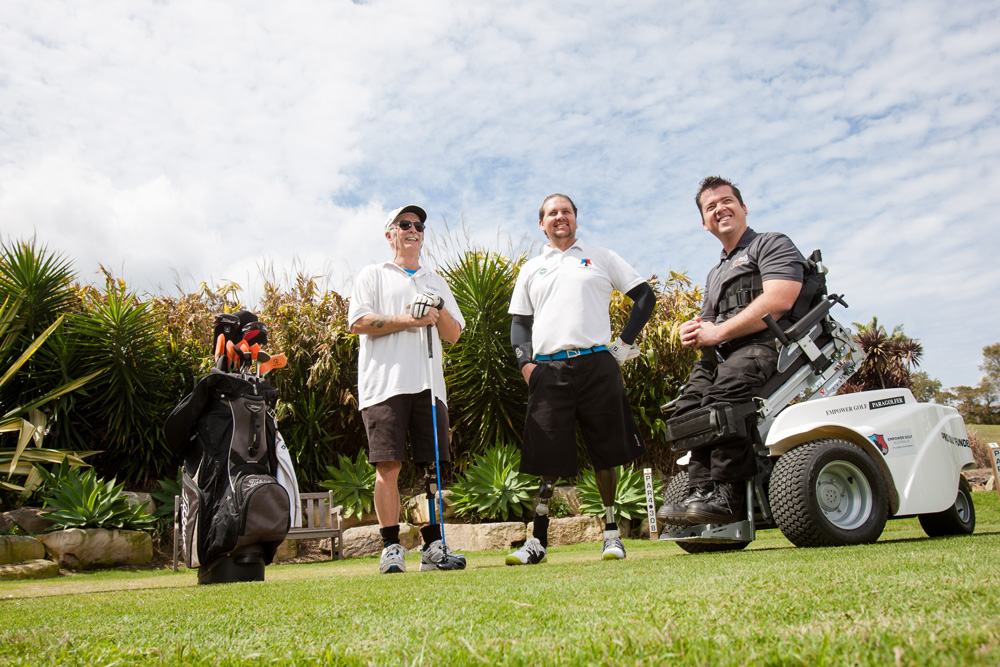
But it is not fulfilling his own goals that gets Ben out of bed every morning – it is the desire to help others via his work with Empower Golf Australia, a not-for-profit organisation that makes it possible for all Australians living with disabilities to play and enjoy golf by providing equipment, physical access and ongoing opportunities at golf facilities nationally and through coaching, course support and clinics.
Through his former role as the President of the Queensland Amputee Golf Association, Ben met the founder of Empower Golf, James Gribble, one of the only quadriplegic golfers in the world.
The pair hit it off from the start and Ben promptly offered to host a golf clinic on the Sunshine Coast for anyone living with a disability. It was such a success that Ben immediately decided to join forces with James, and he now runs the Empower Golf show right across his home state of Queensland.
One of the keys to his success – other than an infectious enthusiasm and glass-half-full outlook – is the Paramotion, an all-terrain wheelchair that raises even the most physically challenged user into an upright position, enabling them to fully swing a golf club.
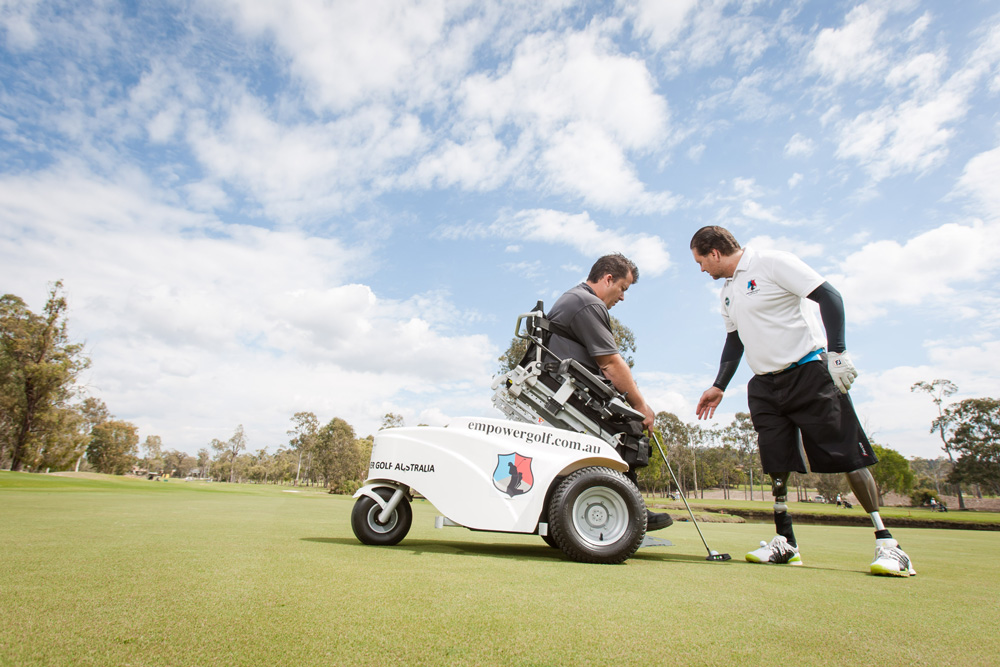
It is no exaggeration to say that, for many people, this piece of kit and a raft of other adaptive equipment have proved life-changing.
“I’ve met some people who have never even stood up before in their lives, and they burst into tears when they use the Paramotion and can stand up for the first time,” said Ben.
“I absolutely love seeing their reactions, and the joy it brings them. It’s amazing to see, and I get a such a kick out of teaching them that it doesn’t really feel like work to me.
“We have over 30 Paramotion now in Australia, 4 in Queensland, and 15 fully inclusive golf facilities set up across the country. I travel around with 2 of the units and a trailer full of other adaptive equipment running golf clinics. I might be down in Coffs Harbour one week then up in Townsville the next. So there’s quite a lot of travelling involved, but I love getting the chance to meet people, hear their amazing stories and hopefully change their lives for the better.
“Empower is also now a registered NDIS organisation which can provide golf lessons, equipment and other services to disabled Australians.”
Golf has certainly changed Ben’s life, and helped him recover – both mentally and physically – from the horrific injuries he sustained in 2002.
He spent almost 12 months in hospital, starting in Bali before being airlifted to Darwin, then onto Concord in NSW for an extended stint until he was eventually transferred to Royal Brisbane and ultimately finishing his hospital rehabilitation on the Gold Coast.
It was another 12 months before he was able to take his first steps, and he spent the next two years learning to use his prosthetic legs with the aid of crutches.
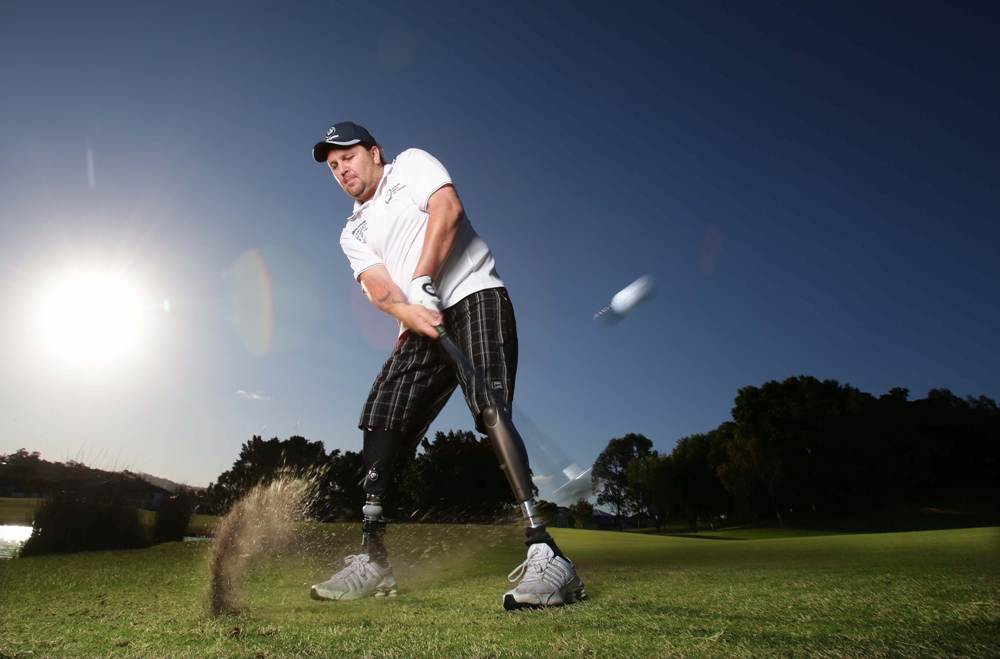
Throughout it all, Ben’s sunny disposition helped him stay positive and he was determined to prove the doctors wrong when they told him he would never walk again.
“I was initially only given a 5 per cent chance of survival, so I managed to beat the odds there and then I was told in the hospital that I should get used to life in a wheelchair, because there was very little chance I’d ever be able to walk again,” he recalled.
“Your balance comes from your big toes, your stomach and your hearing. I don’t have any big toes (or ankles and shins for that matter!), only about 50 per cent of my stomach is remaining, my hearing is completely gone in one ear and I’ve only got 60 per cent in the other. So my prospects of walking again weren’t looking that great!
“But I was determined and I persevered, and eventually I was able to start moving again. It was pretty hard at first, but you’ve just got to keep going. There weren’t too many really low moments, I’ve always tried to focus on the positives in everything I do and I think that positive mindset helped with my recovery.
“Golf has also helped with my recovery. I’d never picked up a club before 2002, so it was all new to me. But it got me out and about and helped me stay active, and it also improved my balance and made my legs stronger.
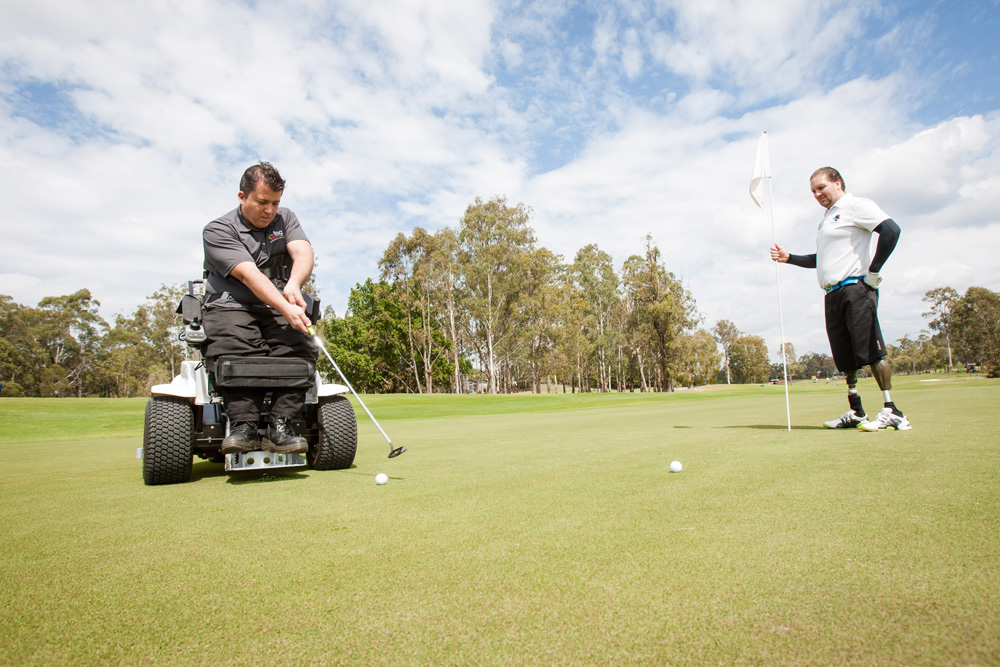
“But the social side and the chance to meet people through golf is what I enjoy the most. There’s a guy I work with, Shem, who entered his first disability golf tournament last year and won a gold medal, which was absolutely amazing.
“I’ve also met Dave Sawtell, who holds the Guinness World Record for hitting the longest drive from a wheelchair; he’s an inspirational guy. And I’m just in the process of opening applications for our first disabled kids’ clinics that we’ll be running in October this year, so I’m really looking forward to that.”
Speaking of records, Ben has received a collection of awards big enough to fill any trophy cabinet – and having previously worked as a furniture importer, he could have a bespoke cabinet delivered in no time should any more accolades come his way.
The 2018 Service to Sport Award was just the latest gong Ben has received and he also featured in the ‘Love Hate Love’ documentary, which was executive produced by Sean Penn and opened the 2011 Tribeca Film Festival.
Not many people get to hang out with Robert De Niro in his apartment in downtown New York – “that was pretty cool,” admits Ben with typical understatement. But when asked what his greatest achievement is, he has no hesitation in nominating his family, comprising his wife Kerrie – whom he married in 2008 – and their two children Sheridan and Rory, aged 13 and eight respectively.
“I’ve come a long way since lying in a hospital bed in Bali not knowing if I was going to live or die,” he said.
“While I obviously had to do a lot of the recovery on my own, there’s no way I’d be where I am today without the love and support of Kerrie and the kids.
“My family is definitely my greatest achievement; I just love hanging out with them and going on holiday with the kids. Neither of them plays golf regularly, Sheridan is more into taekwondo and Rory loves his soccer. But whatever they want to do with their lives is fine by me. As long as they’re happy, I’m happy.”
Sponsors and Supporters










Proudly Sponsored by
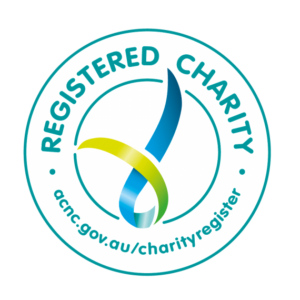
Head Office: 8/47 Gladesville Road, Hunters Hill, NSW, 2110 Australia.
Empower Golf Australia has been endorsed as a Deductible Gift Recipient (DGR) by the Australian Tax Office. EGA is a Public Benevolent Institution and has also been endorsed for Income Tax Exemption and GST Concession. Donations are Tax Deductible for Australian residents. ABN: 18 601 193 122.
These endorsements can be sighted on the ABN Lookup website.